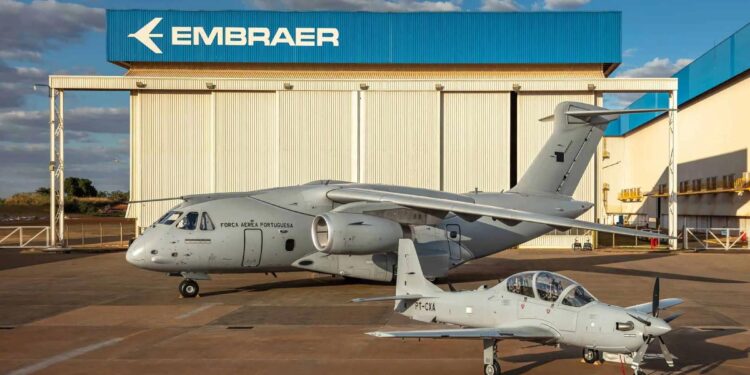Portugal has bolstered its air capabilities with the delivery of its third Embraer KC-390 military transport aircraft, marking a significant milestone for the country’s defense forces. In parallel, Brazilian aerospace giant Embraer has initiated the flight test campaign for its latest variant of the A-29 Super Tucano, the A-29N, aimed at expanding the aircraft’s operational potential. These developments underscore Embraer’s growing footprint in the global military aviation market, offering enhanced solutions for air mobility and light attack roles.
Portugal expands air refueling capabilities with third KC-390 delivery
Portugal continues to strengthen its strategic air operations with the arrival of its third KC-390 multi-mission tanker-transport aircraft from Embraer. This latest delivery enhances the Portuguese Air Force’s capability to execute extended aerial refueling missions, vital for both national defense and NATO commitments. The advanced KC-390s provide not only rapid refueling but also versatile tactical airlift functions, supporting troop deployment, cargo transport, and humanitarian relief operations with greater efficiency and reliability.
Alongside the tanker expansion, Embraer has initiated the flight test campaign for the A-29N Super Tucano, marking a new chapter in Portugal’s light attack and reconnaissance aviation program. This initiative underscores Portugal’s commitment to modernizing its fleet with robust, high-performance aircraft tailored for counterinsurgency and intelligence roles. The synchronized advancement of both platforms positions the Portuguese Air Force to meet diverse operational challenges with improved agility and endurance.
- KC-390 Capacity: Up to 26 tonnes of fuel per sortie
- Flight Range: 2,800 km without refueling
- A-29N Role: Light attack, surveillance, training
- Embraer Support: Ongoing flight test and maintenance programs
| Aircraft | Role | Max Speed | Service Entry |
|---|---|---|---|
| KC-390 | Refueling/Tactical Transport | 870 km/h | 2021 |
| A-29N Super Tucano | Light Attack/Reconnaissance | 590 km/h | Under Testing |
Embraer initiates A-29N Super Tucano flight tests marking key development phase
Embraer has taken a significant leap forward in its A-29N Super Tucano program by commencing the initial flight test campaign. This phase plays a crucial role in validating the aircraft’s enhanced capabilities tailored for the Portuguese Air Force’s operational needs. The flight tests will rigorously evaluate the platform’s advanced avionics, weapons systems, and reinforced airframe designed to operate efficiently in diverse combat scenarios. Embraer’s commitment to precision and reliability is evident as the tests aim to ensure the A-29N meets the highest standards of performance and safety before entering full-scale production.
The campaign is supported by a collaborative approach involving multiple teams dedicated to system and flight performance analysis. Key focus areas during the tests include:
- Navigation and targeting systems integration to optimize mission accuracy
- Durability assessments under various environmental conditions
- Operational readiness in simulated tactical scenarios
This comprehensive flight testing phase not only affirms Embraer’s technological innovation but also reinforces Portugal’s strategy to modernize its air combat fleet with versatile and rugged platforms.
Strategic recommendations for integrating new platforms into Portugal’s defense operations
To maximize the operational impact of the newly acquired KC-390 and forthcoming A-29N Super Tucano platforms, it is essential for Portugal’s defense sector to prioritize a cohesive integration strategy. This involves aligning procurement with comprehensive training programs that emphasize interoperability and multi-domain synergy. Investing in advanced simulation environments will facilitate smoother crew adaptation, reducing the learning curve and enhancing mission readiness. Additionally, establishing joint task forces that combine air, land, and maritime assets can optimize the capabilities of these platforms, reinforcing Portugal’s strategic posture within NATO and regional defense frameworks.
Key strategic initiatives to consider include:
- Developing a phased rollout plan to gradually incorporate new systems without disrupting current operations
- Enhancing cybersecurity protocols tailored to the integrated digital avionics of modern platforms
- Strengthening partnerships with manufacturers like Embraer for ongoing technical support and upgrades
- Investing in cross-platform communication networks to ensure real-time data sharing among units
- Prioritizing maintenance infrastructure improvements to sustain higher operational tempo
| Aspect | Recommendation | Expected Outcome |
|---|---|---|
| Training | Simulation-based joint exercises | Improved crew readiness |
| Maintenance | Dedicated support units | Increased platform availability |
| Communications | Secure interoperable networks | Enhanced situational awareness |
| Cybersecurity | Continuous vulnerability assessment | Resilient digital infrastructure |
Future Outlook
As Portugal’s air force expands its strategic airlift capabilities with the arrival of the third KC-390, Embraer simultaneously advances its A-29N Super Tucano program with newly launched flight tests. These developments underscore both nations’ commitment to modernizing their military aviation fleets amid evolving operational demands. Aviation observers will be watching closely as Portugal integrates the KC-390 into active service and Embraer progresses through the critical phases of the A-29N test campaign, marking significant milestones in the region’s defense aviation landscape.
















